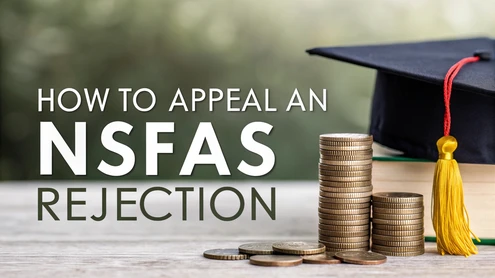The National Student Financial Aid Scheme (NSFAS) is a critical funding source for many South African students who cannot afford the costs of higher education. However, receiving a rejection from NSFAS can be disheartening and stressful, especially if you rely on this financial aid to continue your studies. The good news is that a rejection is not always the final word — you have the right to appeal the decision. This post will guide you through the appeal process step-by-step, helping you understand why your application might have been rejected and what you can do to increase your chances of success on appeal.
Understanding NSFAS and Why Applications Get Rejected
NSFAS provides bursaries and loans to eligible students at public universities and TVET colleges. Its primary goal is to help deserving students from low-income households access education.
Rejections usually occur due to:
-
Income threshold not met: Your household income may be above the qualifying limit.
-
Incomplete or incorrect documentation: Missing or inaccurate documents can lead to automatic rejection.
-
Application deadlines missed: NSFAS has strict deadlines each academic year.
-
Failure to meet academic requirements: NSFAS requires students to maintain satisfactory academic progress.
-
Duplicate applications: Applying more than once for the same funding period can cause confusion.
-
Incorrect or insufficient proof of dependency or guardianship: This can affect income verification.
Understanding the reason behind your rejection is the first step to mounting a successful appeal.
Step 1: Get Your NSFAS Rejection Letter and Understand the Reason
Once your application is processed, NSFAS will send you a letter or SMS informing you of the decision. This communication will usually state the reason(s) for the rejection.
Important: Carefully read this letter and note the specific reasons for the rejection. This is essential because your appeal must directly address these concerns with clear evidence or explanations.
Step 2: Prepare Your Appeal Letter
Your appeal letter is your opportunity to convince NSFAS to reconsider your application. It should be clear, concise, and include the following elements:
-
Personal details: Full name, ID number, contact information, and student number.
-
Reason for appeal: Clearly state that you are appealing the rejection decision.
-
Explanation: Address the reasons NSFAS gave for your rejection. For example, if your documents were incomplete, explain why and provide the missing documents.
-
Supporting documents: Attach all relevant documents to support your appeal, such as payslips, affidavits, medical certificates, or proof of guardianship.
-
Polite tone: Be respectful and professional in your letter.
Step 3: Gather All Required Documentation
Documentation is the backbone of a successful NSFAS appeal. Typical documents you may need include:
-
Certified copies of your ID and your parents’/guardian’s IDs.
-
Proof of income: recent payslips, unemployment letters, affidavits, or social grant letters.
-
Proof of dependency or guardianship if you are not living with your parents.
-
Medical reports if your family has extenuating circumstances.
-
Letters from social workers or community leaders if applicable.
-
Any other documents NSFAS specifically requested.
Ensure all documents are certified and up to date.
Step 4: Submit Your Appeal Correctly and On Time
NSFAS usually provides a deadline for submitting appeals. Missing this deadline may mean you forfeit your right to appeal.
Submit your appeal either:
-
Online: Via the NSFAS online portal or email, if this option is available.
-
By hand: Deliver your appeal letter and documents to your university’s financial aid office or NSFAS regional office.
-
By post: Send via registered mail to ensure it reaches NSFAS.
Make sure to get proof of submission (a receipt, email confirmation, or delivery note) in case you need to follow up.
Step 5: Follow Up and Stay Informed
After submitting your appeal:
-
Keep in regular contact with your university’s financial aid office, as they often assist with NSFAS appeals.
-
Check your email and SMS frequently for any communication from NSFAS.
-
Be patient — NSFAS can take several weeks to review appeals, especially during peak application periods.
Common Tips for a Successful NSFAS Appeal
-
Be honest: Provide truthful and accurate information.
-
Be thorough: Don’t leave out any documents or explanations.
-
Explain changes: If your family’s financial situation has changed recently (e.g., loss of job, death of a breadwinner), clearly explain and provide proof.
-
Seek help: Your university’s financial aid office can guide you and even help write your appeal letter.
-
Avoid multiple appeals: Submit one well-prepared appeal rather than multiple fragmented ones.
What Happens After the Appeal?
Once NSFAS reviews your appeal, you will receive a notification of the outcome. If successful, your funding will be reinstated or activated. If the appeal is denied, you will need to explore alternative funding options such as scholarships, bursaries from private organizations, or student loans.
Alternative Funding Options if NSFAS Appeal Fails
-
University bursaries and scholarships: Many institutions offer their own funding based on merit or financial need.
-
Private sector bursaries: Companies and NGOs sometimes sponsor students.
-
Part-time work or student jobs: Consider campus jobs or online freelancing to support your studies.
-
Student loans: Use cautiously, as they must be repaid after graduation.
Final Thoughts
Getting rejected by NSFAS can feel like a major setback, but remember it’s not the end of the road. By understanding the reasons for rejection, submitting a clear and well-documented appeal, and seeking support from your university, you can significantly improve your chances of success. Take the process seriously, act promptly, and remain hopeful — many students have successfully appealed their NSFAS rejections and continued their education without interruption.
If you found this guide helpful, consider sharing it with fellow students who might be facing NSFAS challenges. Education is a journey — don’t let funding obstacles stop you from reaching your goals!


